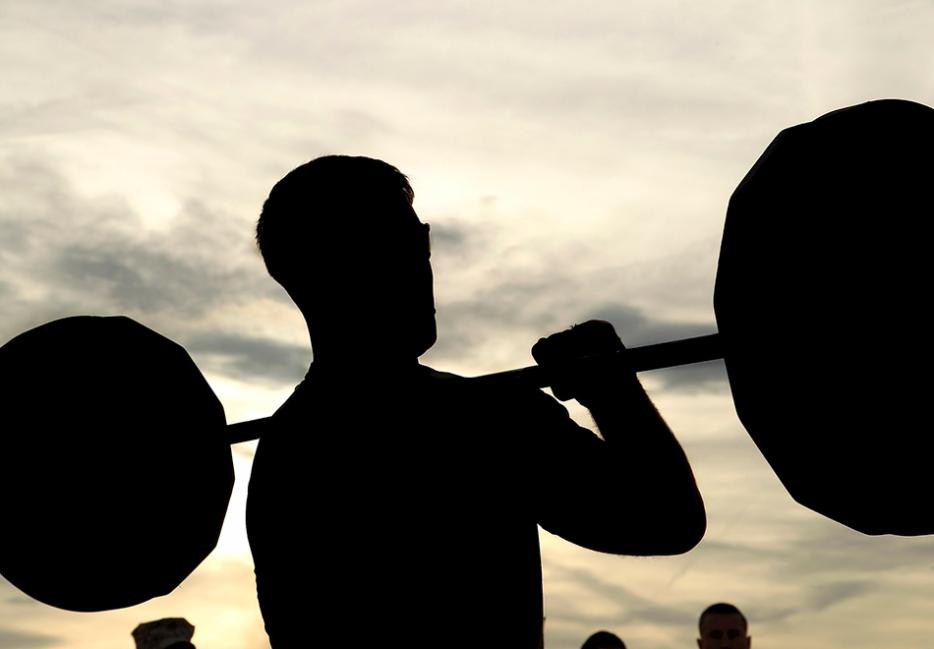What was important to us in 2016? Hazlitt’s writers reflect on the year’s issues, big and small.
I’m at the Olympia Fitness Expo in Las Vegas, one of the largest sports and exercise conventions of its kind in the world. All around me are the trappings of modern muscle mania: vendor booths peddling protein powders, get-thick-quick devices, electrical ab belts, high-fiber bars billed as having the flavor of “red velvet cake” that actually taste like red dog soil mixed with sawdust. I’ve made it to the meathead Mecca, plopped down in the sprawling convention center of a city of dreams that never sleeps. Part of me is elated, because attending the Olympia is an exciting moment for any fitness enthusiast, and part of me is wondering what will happen when this show ends.
*
Like my father and my siblings, I was blessed with bigness. Everything about that bigness, which in my earliest years manifested as chubbiness, conspired to push me towards a future in sports and exercise. “Look at the arms on that boy,” as spoken by some redneck coach for whom “boy” was both an insult and a compliment, was a phrase that chased me well past my teen years.
At first, lifting weights was easy. It was just something I did, my early efforts inconsistent, inefficient, and at times rather mindless. I had no long-term plan to bench-press five hundred pounds or deadlift seven hundred, but neither was I ever trying to reverse my fate as some skinny Mac in whose face sand was kicked—I merely went to the gym to see what I could accomplish between socializing with high school and college acquaintances. In spite of that, I kept getting stronger, and I took joy in watching my body become thicker and denser. In the heady days of the late 1990s, before every single subculture converged on the Internet and jocks embraced nerd culture and nerds reinvented jock culture, I might have been described as a “lifter.”
And the feedback was positive—life-affirming, even. After graduating from the University of North Carolina, I was hired on the spot at a job fair and tasked with managing an Abercrombie & Fitch, a position for which the only qualifications were a college degree and a body suitable for displaying their clothes. In 2003, I won the “tall men’s division” (over 5’9”!) of a bodybuilding contest held in Kalispell, Montana, and though I was the sole competitor in my class, I proudly displayed the oversized trophy I had been awarded. And while trying to figure out what to do with the rest of my life, I blew the doors off a bunch of physical fitness tests for law enforcement positions. These were minor and forgettable accomplishments, to be sure, but at a time when little else was going right in my life, they were all I had.
It seemed that a big man with a big voice was predestined to handle weighty matters, or at least matters involving heavy weights, and that was all there was to it.
Years passed, college at last giving way to graduate school, and I remained big-bodied. By then, this bigness, which I was doing little to actually maintain during the mid-2000s, became a sort of academic calling card. People in the humanities were pursuing their passions, often in strangely stereotypical ways: the person who played college soccer became a transnational historian who studied soccer, the ex-cheerleader became a sociologist who applied the findings of cutting-edge queer theorists to cheerleading and gymnastics. And I was, well, big, so much of my work in cultural studies came to revolve around masculinity and strength.
It bothered me, this notion that my physical appearance somehow dictated my research agenda, but no more or less than remarks like “look at the arms on that boy.” If you were blessed with bigness, you accepted your fate without complaint. Michael Oriard, an NFL lineman who became an English professor, had dabbled in other subject areas before settling comfortably into a role as the “English professor who writes about football.” It seemed that a big man with a big voice was predestined to handle weighty matters, or at least matters involving heavy weights, and that was all there was to it.
*
The path that led me to this year’s Olympia began in earnest in 2009. I was 26, three years away from completing my Ph.D., and had just participated in a university-wide strongman contest. I did well enough for someone who had devoted zero time to preparation for a glorified intramural event, which up until then was how I typically prepared for anything: I arrived and did my thing, not caring overmuch about the result, and departed.
The story should’ve ended there—instead, I entered the orbit of several fellow competitors who had launched the school’s CrossFit club. Suddenly, I was invested in “the sport of fitness.” Back then, CrossFit seemed like an appealingly subversive activity: its teachings, if followed to the letter, would make your body elite. You would have amazing range-of-motion. Your body’s work capacity and survivability would shoot through the roof. All this, in only ten or fifteen minutes of the “workout of the day” (“WOD”).
And I guess it worked, at least in the early going. I charted these WODs on spreadsheets. I started adding “mobility WODs” to improve my flexibility and “strength WODs” to boost my pressing and squatting numbers. I switched from fad diet to fad diet, from a “gallon of milk a day” (“GOMAD”) to paleo to keto. Eventually, I was spending hours a day logging my repetitions and portioning out my lumps of butter and bacon fat, hours I once might have preferred devoting to anything else.
Now, I thought, I was getting somewhere. Maybe I had looked good before, and been strong before, but I was deeply flawed. My body had become stiff and musclebound, more tomb than temple, and it needed to be razed and rebuilt. For once in my life, I wasn’t just going through the paces, however relaxing those paces might have been. I loosened my quads, strengthened my glutes, and placed my faith in that beguiling notion of late nineteenth-century philosophers and social scientists: Progress. Ever upward, never backward, and always breaking parallel on my squats!
Yet CrossFit eventually disappointed me. I bottomed out—a victim, for the first time in my athletic life, of the shoulder injuries that plague competitors who are kipping their pull-ups, thrusting barbells into the air at maximum speed, and performing deadlifts one after the other in rapid succession. The French theorist Jean-Marie Brohm had pointed out decades earlier that rigorous sport and exercise, as distinguished from games we play, amounted to nothing more than a “prison of measured time.” For the first time, I understood what he meant.
What good was I to anyone now, forty or fifty pounds diminished on my three powerlifts? And who was I to write about strength, when my own had begun to wane?
I was still, however, hooked on this notion of functionality. After I had relocated to Dallas to launch my career as an assistant professor at the University of Texas at Arlington, I felt healthy enough to renew my training. I couldn’t bring myself to return to CrossFit, though; its programming, which once seemed novel, now struck me incoherent at best and dangerous at worst. Add to that the fact that CrossFit higher-ups such as founder “Coach”11An honorary title, I assume, like “Kentucky Colonel,” given that fitness whisperer Glassman never coached or participated in any organized sport at an especially high level. Greg Glassman, who is depicted as some kind of exercise Svengali in former Paris Review editor Daniel Kunitz’s recent book Lift: Fitness Culture, from Naked Greeks and Acrobats to Jazzercise and Ninja Warriors, seemed curiously paunchy and out-of-shape in spite of this multi-modality fitness methodology he had discovered. Moreover, the creators of the CrossFit corporate culture were flag-waving libertarians, people who simultaneously valorized the perfectible self even as they heaped unending admiration upon the fallen first responders after whom they named their workouts. I found myself as uneasy among their ranks as I once did in church. In both cases, the true believers gave themselves over to whatever they were doing, whereas I could never set aside my doubts long enough to derive any tangible benefit.
And tangible benefits were what I now demanded. I needed to make Progress, to remove the butt wink from my squats and the slightest evidence of a rounded back from my deadlifts. This quest toward increasing utility brought me to Arlington’s Metroflex, a legendary powerlifting gym that had launched the careers of bodybuilding legends such as Ronnie Coleman, Johnnie O. Jackson, and Branch Warren. There, I worked with experienced coaches and buried myself in the writing of a host of literary lifting muses—the misogynistic Mark Rippetoe, the minimalist Jim Wendler, the Ayn Rand-obsessed Mike Mentzer—to drive my powerlifting competition total to new heights. I videotaped everything, fixated on mistakes and minutiae and keenly aware that others around me were progressing faster, and deleted most of it because the recordings disgusted me.
I had never lifted heavier or felt unhappier. I hated myself when I benched 405 pounds, agonized over whether I had “broken parallel” while squatting 500, and regretted the first thirty-three years of my life even as I deadlifted 650. These numbers were achieved piecemeal at a half-dozen regional powerlifting competitions where the other two lifts always went wrong—a great squat but a terrible deadlift, a bench press undermined by a dead shoulder. Given how long these events lasted (over nine hours, in some cases) and how quickly each of my turns at the platform ended, this left me with nothing but time, hours and hours of standing around while other athletes waited to take their turns, to second-guess my insufficient preparation. Nobody's livelihood was at stake: we had already invested thousands of dollars on gear and muscle-building food, and the available prizes were usually just jugs of protein or gift cards to supplement stores. But our reputations were on the line, and whenever I performed poorly—which seemed like always—my sense of self wound up compromised. I kept preparing to fail by failing to prepare, to borrow the rah-rah patois of the gym.
*
Bit by bit, this serious training got away from me. I fought respiratory diseases, dysthymia, and unceasing urges to deviate from my strict diet—all the usual facts of life that can impair your form and inhibit your functioning. I was writing more about fitness and bodies, yet doing less with my own. I was a fraud, an imposter, and my best life was getting away from me a day at a time. What good was I to anyone now, forty or fifty pounds diminished on my three powerlifts? And who was I to write about strength, when my own had begun to wane?
Covering the Mr. Olympia, then, represented both the fulfillment of a reportorial dream as well as a three-day personal nightmare. Bodybuilding, the world championships of which were the ostensible reason for the weekend, retained the campy, ludic uselessness that had caused muscle magazine publisher Joe Weider to launch the Olympia, in the process parting ways with curmudgeonly York Barbell owner Bob Hoffman and his weightlifting-oriented Mr. America pageants. The Olympia was meant to reward beautiful physiques notwithstanding their ability to pump iron—“train for aesthetics and strength will follow” was Weider’s motto—but the expo itself was a convention filled to capacity with CrossFit demonstrations, powerlifting events, and hordes of salespeople peddling the latest get-fit-quick snake oil.
Around every corner, I encountered ridiculously well-built humans, each invested in the act of getting bigger. Some had clearly been small before, with tiny wrists and waists, whereas others had been gigantic from the outset, like reigning World’s Strongest Man champion Brian Shaw. Shaw, arguably the most massive person at the event and perhaps in the entire world, was nice enough during our brief conversation, but kept cutting his interactions short—his day at the convention represented an unpleasant interruption from the incessant eating and exercising necessary for him to defend his title against top contenders like towering Game of Thrones scene-chewer Hafþór Júlíus Björnsson.
Training, I realized, was what one did at work—how and why had we carried it over to our hobbies, those spontaneous activities meant to bring us joy?
Here, in Shaw, was a man who had truly been blessed with bigness, with ham-hock fists and size-twenty feet, and yet he was still disciplining his body and micromanaging each minute of his day in ways that would make Frederick Winslow Taylor proud. He was a professional strongman, emphasis on professional, and his entire life was spent laboring to create himself. One could write encomia to such dedicated athletes, and thousands of people already have, but it struck me as a rather melancholy existence. Shaw was amazing in the same way champion hot dog eaters were; neither made their occupations seem like a fun way to pass the time.
As Shaw lumbered away, a nutrition company employee at a nearby booth handed me a protein bar that was intended to taste like a Rice Krispie treat.
I accepted the item, as I had dozens of others. “Is that really what it tastes like?” I asked him.
“Nah,” he said, somewhat sheepishly, “but it’s low-sugar, high-fiber, and it’s super good for you.”
*
One of the highlights of this year’s Mr. Olympia was the return of a fifty-two-year-old bodybuilder named Kevin Levrone, a legendary athlete nicknamed the “Maryland Muscle Machine,” for one final turn on the competition stage. Levrone had been a muscle hero to my younger brother; I was interested to see how he would fare in his last run at glory.
His story had received a great deal of attention in the muscle press. Passionate followers of the subculture argued back and forth about whether Levrone would appear on stage in competition shape—a serious concern given that he had allowed himself only six months to train for the event after several years drifting away from a sport that demands round-the-clock body maintenance.
These questions were answered when Levrone appeared on the first night of the pageant to strike his mandatory poses, unveiling an impressive upper torso but legs that, at least relative to those of his enormous competitors, lacked mass and definition.
“His legs were already going when he quit the first time,” explained the retired German bodybuilder Markus Ruhl, who was seated next to me in the press pit.
But Ruhl, still as freakishly huge as a 5’9” man can be, watched Levrone’s routine with interest, and reserved his loudest applause for the man against whom he had competed in several prior Olympias.
On the night of the finals, Levrone, who had failed to make the ten-man cutoff, was given a chance to guest-pose before the throngs of worshipful spectators who packed the Orleans Arena. He went through a graceful flexing routine, smiling handsomely at an audience that would eventually forget him, and bowed. Unlike Cedric McMillan, an unusually expressive bodybuilder who frowned at the crowd after placing seventh, or Shawn Rhoden, who seemed unwilling to acknowledge that he had been selected as the runner-up to six-time champion Phil Heath, Levrone appeared genuinely happy to be there.
He had a sense of where he was, I supposed, and that was sufficient. His body was polished and sharp—not as sharp as it once had been, but sharper than it ever would be again. He was satisfied with the ending to his story.
*
While waiting for my car on the last day of the convention, I spoke with Flex Wheeler, a retired bodybuilder who had won the Arnold Classic—the only bodybuilding event that rivals the Olympia—a then-record four times.
I asked him about the return of Kevin Levrone, one of his contemporaries.
“I don’t know,” he said. “I guess what Kevin did makes me want to get back in that kind of shape, but then part of me knows I can’t, because I wouldn’t be coming back at half of what I was.”
“What about the sheer joy of participating?” I asked.
He brought his hand to his chin, inadvertently flexing a bicep that, though round and massive, surely wasn’t what it once was or could have been. “I was dyslexic, and this was a way that I could support myself. See, you don’t make any money in bodybuilding. You make money because of bodybuilding or after bodybuilding.”
“So you’re not returning to the stage?”
“Nah, I like all the projects I have going on right now,” he told me. “I’m happy with where I’m at.”
*
On the flight home from Vegas, I passed in and out of a restless sleep. My waking thoughts turned to a half-marathon I had entered on a whim back in 2014: I didn’t bother training for the event, because long, slow running is terrible on the body, and on that fateful day I simply slid on a knee brace, popped some ibuprofen, and dragged my 240-pound body through the race in two hours and twenty minutes. It was hardly a Paul Ryan performance, but it afforded me the opportunity to travel through the most scenic parts of Fort Worth in an especially intimate way, and that’s the sensation that lingered.
Other moments flashed before my eyes. Meandering hikes in Glacier National Park, twenty miles here and there simply because. Huge truck tires I’d flipped for the same reason a dog chases its tail, and with a precisely similar purpose. Taking some of my students on a field trip to the second Muscle Beach, the weightlifting platform in Venice, then planking and doing bar-ups and climbing the ropes. The elementary school field days when I would will my chubby body to run and jump past my peers, savoring these fleeting pastoral escapes from the domestic gulag that my parents’ troubled marriage had become.
All of these were experiences that engaged body and soul. They were things I had done because I wanted to prove my powers, and they weren’t reducible to a series of movements in a workout demonstration video. Fitness has, it must be conceded, become more inclusive, with nearly as many women in attendance at the Olympia as men—but all that meant was that there were now twice as many “trainees.” Training, I realized, was what one did at work—how and why had we carried it over to our hobbies, those spontaneous activities meant to bring us joy? Nowadays, you didn’t just lift weights or play Street Fighter; you competed at these things. We were in training; we were athletes; and our heated competitions were no less serious, if far less significant, than the ones strongman Brian Shaw was steeling himself for.
There’s this wonderful scene in Dave Meggysesy’s Out of Their League in which the author, an NFL player gradually becoming disgruntled with his dangerous and dehumanizing sport, starts training on outdoor trails, running as fast or as slow as mood dictates. Instead of running timed laps around a track and answering to the dictates of a hostile coach, Meggysesy now begins to set his own pace, to follow the demands of his body—and he is struck by how happy he felt.
This, and nothing else, is what I want. I’m thirty-four years old, and my somatic limits are clearly established. I can do some things (move heavy objects) and can’t do others (swim). These deeply ingrained habits of work-discipline will die slowly, but I can’t say I’ll miss them after they’re gone—far from it. Let me stop this endless training towards some bad infinite and embrace free play in the only self I’ll ever have.






